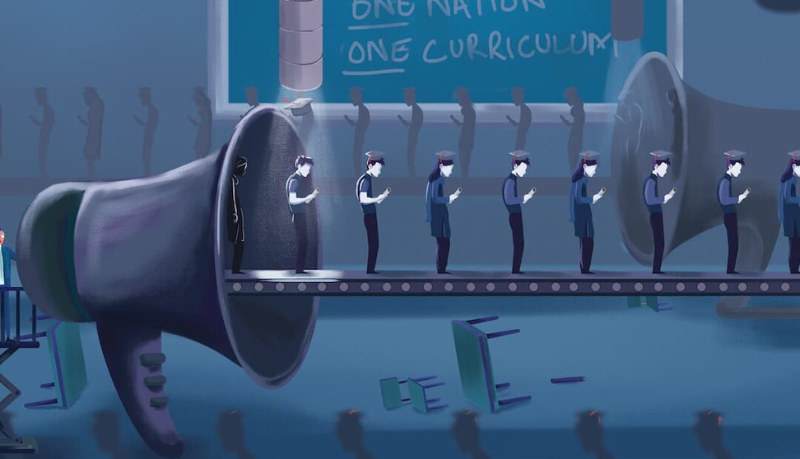
Education Systems in Pakistan
In Pakistan, four separate systems of education and examinations are being followed
- The public school system
- The private school system
- Deeni Madaris system
- Non-formal education system
Each system is following a different syllabus and examination system, causing a wide range of unfairness and communication gap. So uniformity in curricula turns out to be a matter of great concern.

Establishment of National Curriculum Council
National Curriculum Council (NCC) has been created under the Ministry of Federal Education and Professional Training which consists of three members from each Province/Area.
- One from Curriculum Bureaus
- One of Textbook Book Boards
- One from Education Department
Objectives of NCC
The objectives of NCC are as follows:
- To serve as a specialized, advisory, and counseling national body to steer and guide the development of curriculum in close collaboration and consultation with all the federating units to ensure the least quality standards from Early Childhood Education to Grade XII.
- To build up together the set of courses framework leading to minimum curriculum standards.
- To oversee the execution of the curriculum framework by the provinces/areas in their individual provinces/areas.NCC Secretariat has been set up. One of the functions of NCC is to make possible the process of development of the National Curriculum Framework in discussion with all federating units.
The Establishment of (NCF)
The National Curriculum Council has developed a subcommittee National Curriculum Framework (NFC). It consists of representatives from each province/area. Now the outline approved by NCC, the NCF provides guidelines for achieving the national vision, mission, goals, and objectives of education. NCF aims to evolve effective and productive principles, processes, policies, and strategies for curriculum development, implementation, and evaluation and develop a Single National Curriculum.
National Curriculum Framework(NCF) has to address the following concerns:
- Ideological concerns
- Academic Concerns
- Socio-cultural concerns
- Implementation, feedback, and evaluation
- Emerging trends

Ideological concerns
The ideological aspects of NCF include:
- National ideology, integrity, and cohesion
- National goals, aims, and objectives of education
- Foundations of Curriculum (philosophical, psychological, and sociological)
- National and provincial contexts in the curriculum
- The integrity of Muslim Ummah
Academic concerns
The academic aspects of NCF include:
- School stages and Scheme of Studies
- Curriculum, in the spirit of 18th Amendment
- International context and knowledge in the construction in 21st century Pakistan.
- The medium of instruction for various levels of schooling.
- School-age, Early Childhood Education and Development
Socio-cultural concerns
The Socio-cultural aspects of NCF include:
- Set of core values such as compassion and care, hard work, Fairness, Honesty, Integrity, Respect, in different provinces of Pakistan.
- Application of knowledge in the socio-cultural, geopolitical, and religious context of Pakistan.
- Application of knowledge for broader understanding, peace, and development.
Implementation, feedback, and evaluation
The NCF has to implement take feedback an to evaluate on the basis of reports they generate:
- School environment and classroom delivery.
- Teacher preparation.
- Examination and assessment.
- Research, feedback, and evaluation.
Emerging Trends
The emerging trends aspects of NCF include:
- Inclusiveness
- Development of Human Resource in agriculture
- Democracy and constitutional supremacy
- Citizenship
- Human rights
- Environment and climate change
- HIV-AIDS and other fatal diseases
- Entrepreneurship
- Other national /global concerns
- Integrating of ICT in Teaching and learning
The development of a Single National curriculum was the ultimate
Responsibility of NCF.
Single National Curriculum (SNC)

The vision of SNC
One scheme of teaching for all, in terms of curriculum, the medium of instruction, and a common platform of assessment so that all children have a fair and equal opportunity to receive a high-quality education. Developing a Single National Curriculum for the whole country is a step in that direction.
Objectives of SNC
Common Education for all, in terms of syllabus, the medium of education, and a common policy of evaluation which will ensure:
Emerging Trends
The emerging trends aspects of NCF include:
- Every child have a fair and equal chance to receive a high-quality education
- Social blandness and National Integration
- Removal of difference in education content across the multiple streams
- Equal chance for upward social mobility
- Impartiality in education
- Holistic growth of children in the light of emerging international trends and local aspirations
- Inter-provincial mobility of teachers and students
Key Considerations of SNC

- Wisdom of Quran and Sunnah
- Dream of Quaid and Iqbal
- Constitutional skeleton and framework
- National strategies, ambitions and National Standards
- Coalition with the Goals & targets
- Up-coming international trends in teaching, learning & evaluation
- Result-oriented approach Life Skills Based and Inclusive Education
- The focal point on Values, Admiration & approval for different cultures & Religions in a local and global context
- Endorsement of intellectual, spiritual, aesthetic, emotional, social, and physical development of learners
The Implementation of SNC
The Single National curriculum is implemented in three phases:
- The phase-I
- The phase-II
- The phase-III
The phase-I
The phase -I uniform curriculum for class 1 to 5 had been developed and put into practice would be and completed in March 2021.
The phase-II
The phase-II curriculum for classes 6 to 8 would be ready by March 2021 and put into operation by March 2022.
The phase-III
The phase-III curriculum for classes 9 to 12 would be prepared by March 2022 and compulsory by March 2023
The one curriculum is an excellent policy for Pakistan but the Government has to devise plans to implement it properly.
